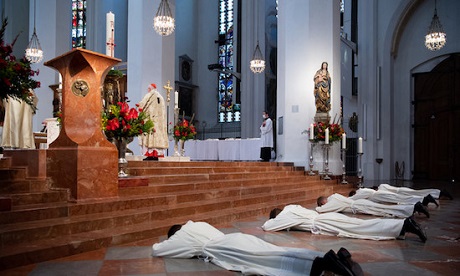The formation of priests is under the spotlight in Germany because of an ongoing reduction in candidates for the priesthood.
Where there were 594 candidates in 2011, this has whittled to just 211 at present, says Heinrich Timmerevers, Bishop of Dresden-Meissen.
The decline in candidate numbers has had Germany’s Catholic bishops considering ways of streamlining the formation of priests.
Timmerevers, who co-chairs the German Bishops’ Conference (DBK) working group, proposes concentrating formation in only three cities: Mainz, Munich and Münster.
Preparatory courses would be held in Freiburg and Bamberg, and pastoral training would be divided between Paderborn, Erfurt, Rottenburg-Stuttgart and a city in Bavaria that has yet to be decided.
This would reduce the 20 places of instruction to nine.
“The reform would do away with long-established structures,” Timmerevers says.
“But new approaches are needed to prepare priests for their future professional challenges. It will be difficult to satisfy everyone.”
Discontent with the proposal has riled many, especially in dioceses that do not figure in the new set-up.
This is true for the city of Erfurt for instance, which was part of the old East Germany. Despite cooperating with five other dioceses, it’s formation center would also be eliminated in the new plan.
Thirty years after the fall of the Wall, closing the formation centre in the former East German city of Erfurt is not an encouraging sign of solidarity for the former GDR,” complained Bishop Gerhard Feige of Magdeburg.
“Moreover, the theological faculties would benefit from drawing inspiration from the curriculum of the Diocese of Erfurt.”
“We are carrying out our mission of evangelization in the region of Germany where secularization is strongest, with more than 80% of the population having no connection with religion,” said.
“Our experience is therefore important in helping priests to familiarize themselves with the development of society,” argued the 68-year-old bishop, a former theology professor at Erfurt.
Universities also say they’re concerned.They fear the loss of seminaries and houses of formation would impoverish all teaching of theology.
There are also teachers of religion courses, which contribute to strengthening inter-religious dialogue.
“Catholic theology must be kept present throughout the university landscape, in as many places and in as many regional and societal contexts as possible,” one university professor says.
Meanwhile, Bishop Georg Bätzing of Limburg, head of the German bishops’ conference, is pointing out the seminary proposal is only a prelude to discussion. No decision has yet been set in stone, he says.
Source
Additional readingNews category: World.




